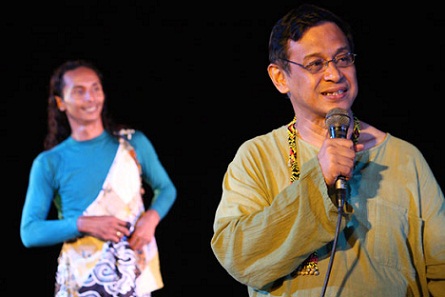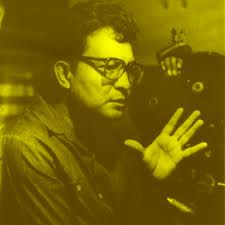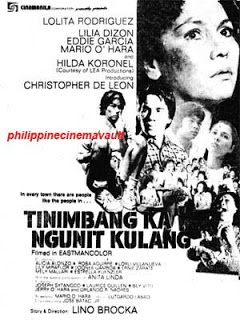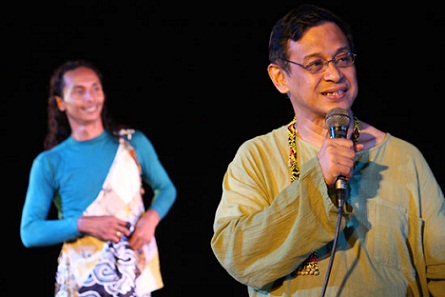By PABLO A. TARIMAN
 THERE is no way you can miss Lutgardo Labad’s presence in the cultural scene.
THERE is no way you can miss Lutgardo Labad’s presence in the cultural scene.
He is the man behind the internationally acclaimed Loboc Children’s Choir and he is a consummate theater advocate even before he headed NCCA’s dramatic arts committee.
But it is in the film industry that his contribution will surely not be found wanting.
He is the musical scorer of Lino Brocka’s landmark film, “Tinimbang Ka Ngunit Kulang” and “Bona,” Eddie Romero’s “Ganito Kami Noon… Paano Kayo Ngayon?”, ” Celso Ad Castillo’s “Julian Makabayan,” Mario O’ Hara’s “Mortal,” Maryo de los Reyes’s “Magnifico” and “Naglalayag,” Lupita Aquino-Kashiwahara’s “Alkitrang Dugo,” and Raya Martin’s “Independencia,” among others.
He turned 62 last week and it was a time as any to reflect where and how he started as film composer.
In the beginning, he eyed priesthood but he didn’t last as seminarian.
A native of Baclayon, Bohol where actor Cesar Montano and director Maryo de los Reyes are distinguished province-mates, Labad was one of the original members of PETA (Philippine Educational Theater Association) in the early 70s where Brocka and actor-director Cecile Guidote Alvarez were two of the pioneers.
He started composing for PETA in 1968 through the prodding of Guidote, who inspired him to do creative music for her theatre works starting with production of ‘Crucible’ and her own version of ‘Larawan.’
 “ It was at PETA where I met Lino (Brocka) who was then our publicity officer. He wanted me to compose music for his movies. I would say that it was in ‘Tinimbang’ where I got my first big break. It was his first produced film and almost all of PETA got involved. It was a very exciting time for me. I wanted to explore new paths in film scoring by using indigenous instruments, creative notation and participative composing with the orchestra,” Labad recalls.
“ It was at PETA where I met Lino (Brocka) who was then our publicity officer. He wanted me to compose music for his movies. I would say that it was in ‘Tinimbang’ where I got my first big break. It was his first produced film and almost all of PETA got involved. It was a very exciting time for me. I wanted to explore new paths in film scoring by using indigenous instruments, creative notation and participative composing with the orchestra,” Labad recalls.
Indeed, that “’Tinimbang…” film scoring was memorable for many reasons apart from it being his big debut in the movies. For this film, he brought a group of Kalinga musicians who improvised with him on the gangsas and jaw’s harp. “I mobilized a chamber string orchestra by giving them melodies and who also improvised based on my visual creative notations. I asked the UP Madz (now the Philippine madrigal Singers) to sing the choruses of the melodies and my lead singers then were Lolita Rodriguez and Spanky Manikan. The lyrics of the Kwala’s Theme were by poet Emmanuel Lacaba and the love song was by dear friend playwright Dandy Nadres.”
The film scoring done in the Sampaguita Studios was shocking to the studio insiders. At the time, they were using the pre-digital equipment consisting of the big magnetic tapes used for splicing music
To be a good film scorer according to Labad, practitioner must first know about music.
Second, he must love the movies and he must continually expose himself to all the good local and foreign movies and be in touch with the latest technology.” Of course he must be able to feel and feel deeply the human condition,” he says.
 “I knew music at an early age but I guess I never had the time to polish my competence in orchestration, harmony and arrangement because at the time, I was busy and focused on my theatre work as director and curriculum developer in PETA. That is why I had to request other arrangers to work with me like Vince de Jesus, Danny Favis, Dodgie Fernandez, Jeff Hernandez and Romeo Mascarinas,” he adds.
“I knew music at an early age but I guess I never had the time to polish my competence in orchestration, harmony and arrangement because at the time, I was busy and focused on my theatre work as director and curriculum developer in PETA. That is why I had to request other arrangers to work with me like Vince de Jesus, Danny Favis, Dodgie Fernandez, Jeff Hernandez and Romeo Mascarinas,” he adds.
His involvement with music started in his Baclayon home where he belongs to a musically inclined family.
At age 7, he remembers his mother, Nena Labad, accompanying herself on the piano while singing kundiman from memory. “I was glued and magnetized,” he recalls. “Then she asked my grandpa to teach me and my brothers the basic solfeggio, reading and singing Eslava’s Metodo. My Lolo taught me my first piano lessons and later my parents hired a piano teacher named Miss Lacson from St. Scholastica’s College. I enjoyed all my piano lessons from age 8 to 12 and it continued in the seminary. From the very start, I really felt music would be my calling and would be a big part of my life.”
On the 62nd year of his life, Labad credits his parents for paving the way to a highly creative life in music, theater and film.
Meanwhile, other dreams continue to haunt him like doing a musical on her mother, establishing an excellent arts school in Bohol steeped in local heritage and the arts and — a symphony orchestra for Bohol.
Of his successful film life, he admits he owes it all to Brocka: “Lino was a most trusting and trusted friend. He inspired all of us near him to be frank, be ourselves, and to be in close touch with realities…He was so down to earth with his dealings with people and so full of love for his friends. He was an actor’s director, motivating actors without being pedantic, theoretical, but demonstrating with detailed gestures, inflections, stories, with so much clarity and directness. He was a firebrand of a leader when he led with many others the parliament of the streets for the much needed political change. He was a man full of passion, integrity, instinct, and love.”
Philippine cinema is much more fascinating because two great minds met.
